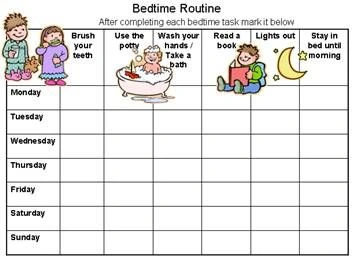On weekends, grandchildren spend much time with us, usually having fun, laughing, and having good times. However, as a grandparent, looking after a young child and establishing a routine when bedtime approaches are great. Read this article to learn how to create a built-up ‘template for weekend instructions for a grandparent’s bedtime. Guaranteeing a smooth transition from play to sleep for you and your grandchildren.
Bedtime routines: Why it is important.

Children should have a routine bedtime routine. It not only aids them in relaxing but also indicates to their bodies that it’s time to rest. If new parents are new, it’s often easier to have something structured to look forward to during hard times when balancing child care can be difficult.
A Good Bedtime Routine Benefits
1. Better Sleep Quality
Sticking to a bedtime routine is also a good idea and the best way to fall asleep faster and get the deeper sleep that children need for developmental stages. A good night’s sleep also leads to a better mood, cognitive function, and health.
2. Emotional Security
Routines provide a sense of stability, especially during periods of separation anxiety, which means children feel safe and secure in different ways. Knowing what to expect can relieve fear and help enhance this feeling.

3. Easier Transitions
Understanding or structure helps children to become less resistant to going to bed. This is especially important since small children thrive on predictability.
4. Strengthening Relationships
Quality time with a child’s grandparents and grandchildren is a gift, and a bedtime routine is a particularly great way to spend it for those lucky enough. Time would help the parent-child relationship and make memories that last a lifetime.
5. Encouraging Independence
This is an excellent idea for older kids and helps grandchild’s parents as they grow: A routine teaches kids how to self-soothe and how to become independent sleepers.
Weekend Week Grandparents Bedtime Instructions Template
Step 1: Prepare for Bedtime
Preparation is key.
- Set a Consistent Time: Pick a bedtime that they will live with you. Be consistent, even on weekends. This parenting time schedule is very useful in regulating their internal clock and helping them fall asleep much more easily.
- Create a Calm Environment: Change is made with dimmed lights and less noise. It lets a calming environment read that it’s time to wind down. If you’re doing a baby massage and preparing your baby for a massage, soft music or a white noise machine can help set the scene.

Step 2: Wind Down Activities
Do calming things before bed. Here are some ideas:
- Reading Bedtime Stories: You would read a couple of bedtime stories together. But, doing this will develop reading into something that a child loves, and it will also create a welcoming, comfortable routine. You might even end the Day with a goodnight prayer. If you have already decided that you will see your minor children at home during your parenting time, you need to choose age-appropriate and relevant books to read with them.
- Quiet Games: Low-energy games like puzzles or coloring provide relaxing quiet times during which other things can be done during leisure time (also called quiet times) with adult children. So quickly (and this can happen for anyone), it can become a lazy walk from the stimulation of the Day to the blankness of bedtime.
- Gentle Conversations: Share the Day, what was good about it, and what was the high point of it. This can also be a good way to foster and help build the parent-child bond. Open-ended questions can help them figure out what they want to say.
Step 3: Hygiene Routine
A hygiene routine is very important. Here’s what to include:
- Brushing Teeth: Routine Day care is great, but brush your teeth with a timer or a song. Or maybe you even let them pick from the toothbrush or toothpaste flavor.
- Bathing: It’s time for bed because a warm bath soothes. If it’s going to be fun, add bubbles or toys to the bath.
Step 4: Bedtime Rituals
Establish rituals that make bedtime unique:
- Goodnight Hugs: Encourage a hug or cuddle session to create closeness. Physical affection comforts children.
- Nighttime Affirmations: End a day well with positive affirmations or thoughts to keep the day on a good note. This can help bolster self-esteem and increase the tone quality for tomorrow’s singing.
Step 5: Tucking In
Once the rituals are complete, it’s time to tuck them in:
- Comfort Items: The idea is to give them something they have, like a favorite stuffed animals or blanket. They would provide you with some reassurance and comfort should you adorn the night.
- Nightlight: A soft nightlight soothes younger people who are afraid of the dark. You could try finding a nightlight with a softer light, which will help your bedroom feel more peaceful.
Tips for Successful Bedtime
1. Stay Calm
If your kids resist bedtime, stay patient. Don’t get frustrated. Your demeanor will react to what they see, and whether they will stay down.

2. Be Flexible
Routines are great, but if the kids are energetic or excited, be willing to let some tweaking if things have been a hectic Day (fast with new things). Sometimes just a little more playtime can be a real help when they seem a bit tense.
3. Communicate
This is where you tell them why sleep is essential and why it is that sleep helps them grow and feel better. Using age-appropriate language, help them understand the benefits of a good night’s sleep.
4. Encourage Independence
Tell the child they want to encourage them to tell you they are tired and show them when they are tired. It also makes you feel autonomous and responsible.
5. Involve Parents
Tell the child’s parents about the bedtime routine. Talk to us about what you notice and what you’ve observed. It will also make parents feel connected.
Table For Effective Bedtime Routines for Grandchildren
| Routine Element | Benefits | Tips |
|---|---|---|
| Consistent Bedtime | Regulates sleep patterns, improves sleep quality | Establish a fixed bedtime and stick to it as much as possible. |
| Calming Activities | Reduces stress and prepares the body for sleep | Engage in quiet activities like reading, listening to calming music, or taking a warm bath. |
| Limited Screen Time | Minimizes exposure to stimulating blue light | Avoid screens for at least an hour before bedtime. |
| Comfortable Sleep Environment | Creates a peaceful and inviting atmosphere | Ensure the room is dark, quiet, and cool. Use comfortable bedding and pillows. |
| Positive Reinforcement | Encourages good behavior and promotes a positive association with bedtime | Reward positive bedtime behavior with praise or small rewards. |
| Gentle Parenting Techniques | Reduces resistance and promotes cooperation | Use gentle language, avoid power struggles, and offer choices when appropriate. |
FAQs About Template Weekend Instructions For Grandparent’s Bedtime

Q1. If my grandchildren don’t want to go to bed, what do I do?
Perhaps you could bear it to try and explain why they fight it. Let them feel like they have any sense of control and offer choices when you do the routine, such as they can choose a book. Sometimes you can help transition by letting them choose their pajamas.
Q2. What is the ideal duration for a bedtime routine?
Aim for 30 to 60 minutes. It’s enough time to wind down without it going on for too long. If the process becomes too prolonged, frustration can also brew for you and the kid.
Q3. Is it okay to use tech at nighttime?
Some technology can be calming (such as audiobooks), but screens can stimulate us more than soothe us, so it’s best to limit screen time. If you must use technology, try switching time and using it much closer to bedtime than right before bed.
Q4. What if my grandchildren want to go to bed at different times?
When you have to care for several grandchildren, try to make some sort of compromise that suits everyone. Sometimes, you must play around with it more and Forget the routine. That’s okay because that’s how every parent does it, probably better than everyone else, too, because at least once you’ve done it to your own child!
Q5. How can I coach good sleep habits?
Ask them to share with you their feelings about sleep, and if their behavior is good, use praise or small incentives as a reward. Both grandparents and parents can also feel better armed with emergency contacts and phone numbers in their pockets or purses.
Q6. Should I do something if my grandchild won’t sleep?
If your grandchild can’t fall asleep, change the bedtime routines, do deep breathing exercises, or stretch. Herbal tea (suitable for children) can also sometimes be helpful.
Q7. How do I support my grandchild with separation anxiety?
They just need to feel reassured that their parents will come back and create a nice environment. If you want to hear more about their childhood stories, you can ask them to look at family photos and stories about their parents and children’s lives.
Conclusion
With the help of the following steps and tips, you’ll be able to create a bedtime experience that is peaceful and relaxing. So, remember, the objective is to entice a feeling of security and connection, and every parent visit is something you and your grandchildren remember.

Bedtime can be a highlight of the weekend, laced with warmth and love, with a little preparation and a little creativity. Whether through storytelling, gentle conversations, or just cuddling up together, you can make bedtime a great experience to build closeness with your grandchildren. These are the good times, and you need to embrace these moments because they will be remembered for years to come!
- Who Invented a Pillow? Evolution and Significance of Pillows - February 24, 2025
- Rattan Sofa Halbrund Perfect For Luxury and Comfort - February 19, 2025
- Sweet Dreams Pillow A Luxurious Sleep Experienc - February 16, 2025
